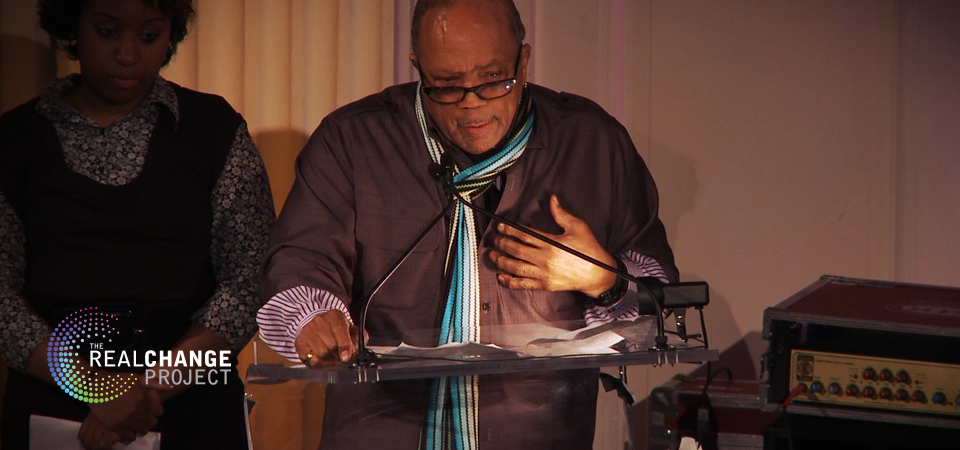Quincy Delight Jones, Jr. (born March 14, 1933) is an American record producer, conductor, arranger, composer, television producer, film producer, instrumentalist, magazine founder, record company executive, humanitarian, and jazz trumpeter. His career spans six decades in the entertainment industry and a record 79 Grammy Award nominations, 27 Grammys, including a Grammy Legend Award in 1991.
In 1968, Jones and his songwriting partner Bob Russell became the first African-Americans to be nominated for an Academy Award for Best Original Song, their “The Eyes of Love” for the Universal Pictures film Banning. That same year, he became the first African-American to be nominated twice within the same year for an Academy Award for Best Original Score, as he was also nominated for his work on the film In Cold Blood (1967). In 1971, Jones was the first African-American to be named as the musical director/conductor of the Academy Awards ceremony. In 1995 he was the first African-American to receive the Academy’s Jean Hersholt Humanitarian Award. He is tied with sound designer Willie D. Burton as the African-American who has been nominated for the most Oscars; each has received seven nominations.
Jones was the producer, with Michael Jackson, of Jackson’s albums Off the Wall (1979), Thriller (1982), and Bad (1987), as well as being the producer and conductor of the charity song “We Are the World”.
He was inducted into the Rock & Roll Hall of Fame in 2013 as the winner, alongside Lou Adler, of the Ahmet Ertegun Award. Among his awards he was named by Time Magazine as one of the most influential jazz musicians of the 20th century.
Philanthropy
ones’s social activism began in the 1960s with his support of Dr. Martin Luther King Jr. Jones is one of the founders of the Institute for Black American Music (IBAM), whose events aim to raise enough funds for the creation of a national library of African-American art and music. Jones is also one of the founders of the Black Arts Festival in his hometown of Chicago. In the 1970s Jones formed The Quincy Jones Workshops. Meeting at the Los Angeles Landmark Variety Arts Center, the workshops educated and honed the skills of inner city youth in musicianship, acting and songwriting. Among its Alumni were Alton Mc Clain who had a hit song with Alton Mc Clain and Destiny, and Mark Wilkins[disambiguation needed], who co-wrote the hit song “Havin’ A Love Attack” with Mandrill, and went on to become the National Promotion Director for Punk / Thrash record label Mystic Records.
For many years, Jones has worked closely with Bono of U2 on a number of philanthropic endeavors. He is the founder of the Quincy Jones Listen Up Foundation. A nonprofit organization that built more than 100 homes in South Africa which aims to connect youths with technology, education, culture and music. One of the organization’s programs is an intercultural exchange between underprivileged youths from Los Angeles and South Africa.
In 2004, Jones helped launch the We Are the Future (WAF) project, which gives children in poor and conflict-ridden areas a chance to live their childhoods and develop a sense of hope. The program is the result of a strategic partnership between the Global Forum, the Quincy Jones Listen Up Foundation, and Hani Masri, with the support of the World Bank, UN agencies and major companies. The project was launched with a concert in Rome, Italy, in front of an audience of half a million people.
Jones supports a number of other charities including the NAACP, GLAAD, Peace Games, AmfAR and The Maybach Foundation. Jones serves on the Advisory Board of HealthCorps. On July 26, 2007, he announced his endorsement of Hillary Clinton for president. But with the election of Barack Obama, Quincy Jones said that his next conversation “with President Obama [will be] to beg for a secretary of arts,” This prompted the circulation of a petition on the Internet asking Obama to create such a Cabinet-level position in his administration.
In 2001, Jones became an honorary member of the board of directors of The Jazz Foundation of America. He has worked with The Jazz Foundation of America to save the homes and the lives of America’s elderly jazz and blues musicians, including those who survived Hurricane Katrina.[citation needed]

